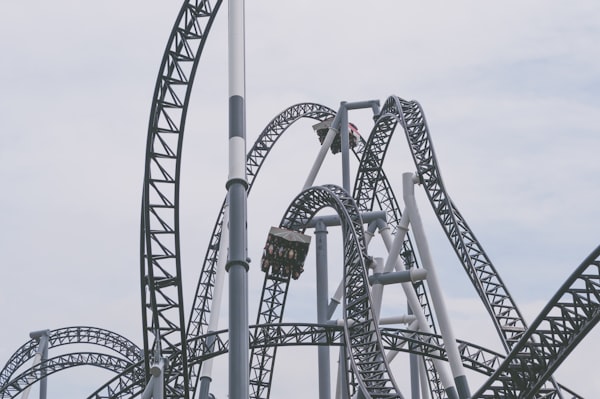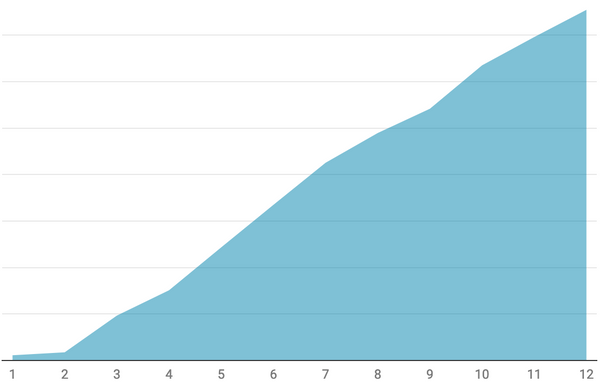We are shutting down EventNinja. This is what I have learned.
What I've learned from the rise and fall of EventNinja.

13 months ago Anthony and I decided to pivot our event company and focus exclusively on analytics for event organisers. Today we sadly announce that we are shutting EventNinja down.
In the beginning it was easy.
Our simple idea was that in an increasingly data-centric world, event organisers where still in the medieval age lacking a data-driven decision making approach. They would, in the best scenario, fumble around with huge spreadsheets telling them nothing about the actual behaviour or level of engagement of their attendees.
EventNinja was our solution to that problem: a one-click integration for Eventbrite users to analyse all their data and present them with meaningful reports. Before we had even built the prototype Eventbrite reached out to us.
It sounded like a great idea. We were incredibly excited.
Our goal was to build a platform where event promoters can identify, reward and mobilize their top customers.
We asked ourselves why nobody has thought of that before.
We spent 3 months building the platform ensuring both design and functionality were slick. We built what was (and arguably is) the most advanced analytics platform for Eventbrite. 15 metrics tracked in almost real time plus a new generation CRM built specifically for event organisers and their needs. Eventbrite even featured us on their homepage and in their marketplace (Spectrum).
We started getting a few paying customers and Eventbrite put us in its presentation for their internal annual conference.
We worked hard and were terribly proud of the result.
We came far and we thrived in many ways — but we also faced challenges.
Flash forward 13 months. Today we are closing down the company.
Despite our partnership with Eventbrite, we have failed to find Product/Market fit and create a sustainable business.
I don’t usually write about personal things, but in this case I think writing will help me analyse and understand things better. So here they are, the lessons I have learned over the past 13 months.
- Test your market first
We built EventNinja without ever testing if there was a real need for such a tool. Everything was mostly based on our intuition and our event organiser friends telling us that “it was a very cool idea”. We never actually stopped to ask them if they would pay for it and that was a rookie mistake because we spent the majority of our time chasing potential customers. - Achieve Product/Market fit as fast as you can
As Marc Andreessen wrote in a famous post, try to achieve Product/Market fit as fast as you can or you’ll run out of either money or motivation. Ultimately I do believe that our product was a good enough product but perhaps for a different segment of the market. We spent so much time and energy trying to figure out who these people were that we ran out of money AND personal motivation. - (Don’t) listen to user feedback
When things get rough you hang on every little hope. You tell yourself that with THIS feature or THAT new homepage things will get better. Usually you are just lying to yourself. One of our biggest mistake was to build features for users who said they MIGHT become paying customers if we only added that feature. This was another rookie mistake. You should listen to users feedback but never ever EVER build a feature just to close a sale. If you can’t sell your product either it’s not good enough (hence you have a product problem) or you are targeting the wrong audience (hence you have a marketing problem). Neither of these problems will be solved by building a feature to win one customer. - Be passionate about the problem you are solving
When other people told me that I had to be passionate about the problem I was solving, I didn’t really understand. Why do I have to be passionate? I see a problem, I think I have a solution. It’s just business; as long as it makes money it’s fine. What I failed to understand is that starting and running a business is incredibly hard with many dark moments. If you are not hugely passionate about solving THAT specific problem you will eventually lose mental energy, focus and productivity. In hindsight, events were never really something we were interested in. We liked data and thought we had a good solution. It turns out that’s not enough. - Mental energy is not infinite
People who work in startups often underestimate the mental energy needed to run it. You constantly need to be on top of everything, manage communications, bugs, new feature, sales, customer support, etc.
Founders are usually shy of talking about their failures. They just want to disappear. And I am no exception. It’s not easy to write about this.
But I do believe that by sharing experiences we can all get better and feel a bit less lonely. For me, writing helps me see things in perspective. In life we don’t get only one shot. Life is full of opportunities. You just need to be ready to take them and I believe that by learning from our mistakes we become better people.
Before I finish this post, I cannot forget a couple of thank yous.
Thank you to Eventbrite, which has been great all the way through, supporting us in any possible way. It’s a great company full of generous talented people and the first ones to believe in us.
Thank you my friends, who have been there for me and from whom I’ve learned so much.
Thank you Anthony, the best business partner I’ve ever had and, most importantly, you have been a true friend. If I’ve learned so much in these years it is because of you and the books you recommended me to read. You pushed me to challenge my thinking and by doing so you have made me a better person.
Thomas Edison famously said:
“I have not failed. I’ve just found 10,000 ways that won’t work.”
Because in life you never really fail. You learn something new and grow as an individual. Because in the end, it’s never THE END.


